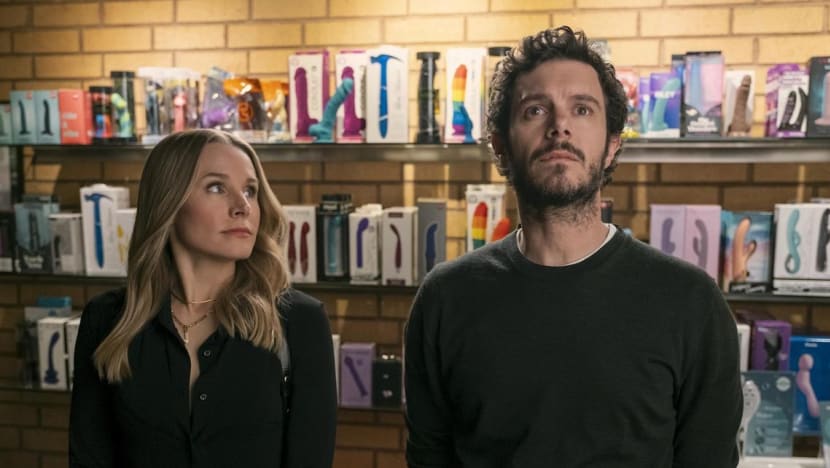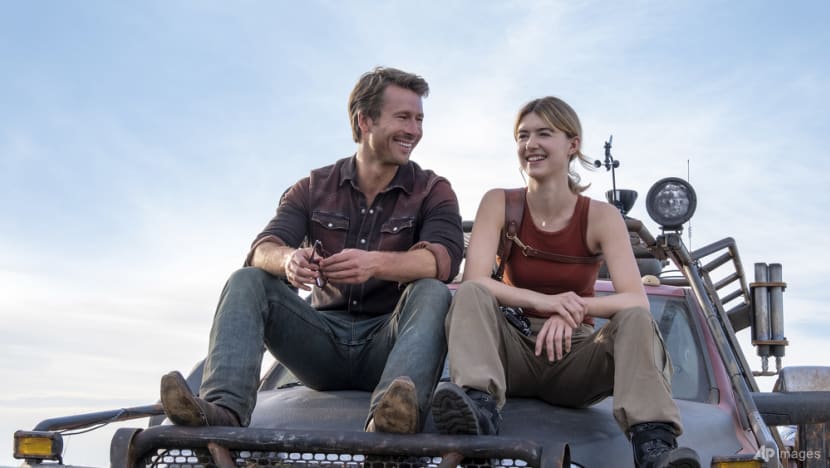Commentary: Why we all went gaga for emotionally mature men in 2024 – and why it's a bane for real-life dating
The modern romantic hero models connection and vulnerability, but content strategist Maelyn Lagman asks: Is he just setting us up for more disappointment?

Kristen Bell (left) and Adam Brody star in Netflix's hit romantic comedy series, Nobody Wants This. (Photo: Netflix)

This audio is generated by an AI tool.
SINGAPORE: By the time I turned 18, I had the timeline of my love life mapped out: Relationship by 24, marriage by 26, and my first kid by 28.
Now, still single at 25, I feel ready for a relationship, even marriage, but I just haven’t met “The One”.
I’m not alone – many young singles in Singapore are holding out for “the right person”, according to a study by the National Youth Council and the Institute of Policy Studies released in August 2024.
Are we all single because we believe in finding The One? Or is it the very concept of The One itself that’s keeping this person out of our reach?
But where did we get this concept to begin with?
CLASSIC ALPHA MALES
My first introduction to love and relationships came through romance novels featuring alpha male heroes: Powerful, stoic, impossibly wealthy, and Greek-god handsome.
Edward Cullen from Stephenie Meyer’s Twilight series was my initiation into this archetype.
I was captivated by his fierce protectiveness and emotional unavailability – an intoxicating mix for a girl of 11 just beginning to develop a fascination with romance. Meyer topped it all off with his dazzling good looks (pun intended). I bought into the fantasy, naively equating his intensity with depth.
The “strong, silent male” has long captured the imaginations of readers, from Heathcliff in Emily Bronte’s Wuthering Heights and Mr Rochester in Charlotte Bronte’s Jane Eyre. These brooding romantic leads paved the way for their modern counterparts: Christian Grey in Fifty Shades of Grey, Damon Salvatore in The Vampire Diaries, and so on.
Their overt masculinity, emotional detachment and obsessive control positioned them as protectors – but not without cost.
In their romantic relationships with women, they created power imbalances, stifled their own and their partner’s personal growth and development, and normalised unhealthy dependencies.
Yet, these archetypes endure because they tap into something primal: The idea that domineering strength and decisiveness equate to reliability and leadership in a relationship. They remind us of a time when survival depended on roles in romantic relationships being clearly defined, offering the illusion of simplicity and security – even if they reinforced flawed power dynamics.
But over time, as women became more empowered – shattering glass ceilings, taking on leadership roles, and asserting financial and personal independence – the mass-media image of their ideal partner evolved.
THE NEW ROMANTIC IDEAL MAN
Women now seek equality and equity in their partnerships, looking for men who are emotionally aware and can communicate in tense or emotionally charged situations without resorting to aggression or violence. (Sorry, Chuck Bass from Gossip Girl.)
This shift is exemplified in the most popular male leads of modern romance: Noah Roklov from Netflix’s Nobody Wants This; Glen Powell’s characters in box office hits Twisters and Anyone But You, and every single hero written by rising romance queen Emily Henry.
Where classic alpha males demand submission, these new romance heroes offer partnership.
They reassure their partners with quiet confidence, gently acknowledging their insecurities without forcing immediate change.
They connect with their female love interests by being not just physically but emotionally present, supporting her growth and healing with preternatural patience.
They model masculine vulnerability, showing their fears and flaws – and they often have a good sense of humour to show for it.

However, while this shift may seem like progress, it introduces its own challenges.
The alpha male’s pitfalls were clear: Smothering control, emotional detachment and a lack of genuine connection. On the other end of the spectrum, the emotionally available archetype imposes another impossible standard: Men who are perfectly self-aware, emotionally articulate and unwaveringly supportive at all times.
This isn’t to diminish the value of emotional intelligence – openness and communication are critical in any partnership. But these qualities take time and effort to cultivate. When portrayed as innate or effortless, they create new pressures on men to reach unrealistic standards or ideals without room for growth or mistakes.
At the same time, it reinforces the idea for women that emotional fulfilment must come from a partner, rather than being a shared responsibility or something we can cultivate independently.
By setting such high expectations, we risk undermining the connection we’re striving so hard to find and build, leaving both parties feeling burdened and unfulfilled.
THE PITFALLS OF “PERFECTION”
The real danger is not in romantic stereotypes or masculine ideals.
It’s in seeing relationships as transactions where each partner must check all the boxes of perfection – whatever “perfection” happens to look like at the moment – rather than as dynamic, imperfect journeys of mutual support.
Dating apps amplify these unrealistic expectations. People are reduced to profiles – curated snapshots and a few trivial details that we swipe left or right on according to whether or not they appear to tick enough boxes on our mental checklist of the “perfect partner”.
A friend in the same boat has tried every dating app available, even upgrading to premium versions, hoping to improve her odds. It didn’t work. She found herself matching up only with “alpha” types who lacked emotional depth or emotionally available men who seemed perfect on paper but with whom she felt no chemistry.
Both archetypes of The One – the alpha male and emotionally evolved man – set us up for disappointment by selling us fantasies, whether it’s one of all-consuming passion and protection or one of effortless emotional support. Neither offers a realistic portrayal of real men in real relationships.
True connection requires us to move past these narrow archetypes and accept the reality that no single partner will ever meet every expectation – because they can’t.
Real relationships aren’t built on perfection, and real people don’t fit neatly into any one trope.
I’ve seen how my own dad bungles emotionally fraught conversations with my mum and may not always have the right words – but unfailingly shows up for her when she needs him. My brother makes an effort to communicate his concerns with care to his wife, but sometimes still gets carried away by his fiercely protective tendencies.
Instead of seeking perfection, relationships flourish when both participants focus on complementing one another’s strengths and navigating each other’s weaknesses with grace and patience. We must, like with so much else in life, acknowledge human limitations while still striving for growth.
So, instead of giving up on love, let’s put down our idea of The One and the notion that it must mirror the stories we love.
In the end, love isn’t about finding someone perfect. It’s about building something meaningful with someone who shows up, learns and grows with you – one imperfect moment at a time.
Maelyn Lagman currently leads content strategy at a Singapore startup.


















